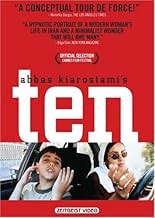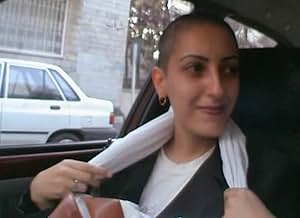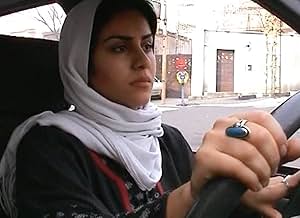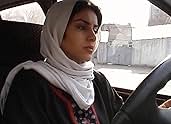CALIFICACIÓN DE IMDb
7.4/10
8.9 k
TU CALIFICACIÓN
Agrega una trama en tu idiomaA visual social examination in the form of ten conversations between a driving woman and her various pick-ups and hitchhikers.A visual social examination in the form of ten conversations between a driving woman and her various pick-ups and hitchhikers.A visual social examination in the form of ten conversations between a driving woman and her various pick-ups and hitchhikers.
- Dirección
- Guionista
- Elenco
- Premios
- 1 premio ganado y 4 nominaciones en total
Amina Maher
- Amin
- (as Amin Maher)
Roya Akbari
- Prostitute + Lover
- (as Roya Arabshahi)
- Dirección
- Guionista
- Todo el elenco y el equipo
- Producción, taquilla y más en IMDbPro
Opiniones destacadas
My experience with Iranian film is pretty superficial having only seen a handful, but none have disappointed me. I saw Kiarostami's early film Where Does The Friend Live? and was completely blown away. I then saw Saalam Cinema by Iran's other giant Mohsen Makhmalbaf - and then I realised just how important this country's output has been.
Ten did nothing to diminish this view, and I'll try not to repeat much of what's already been said here. I saw an Iranian person on this site claim that there was too much lost in the translation from Farsi to English. This is always the case with translation, but I am quite sure Ten gets away with it. I recently saw Ingmar Bergman's Saraband and if you think language being stilted ruins a movie then I am sure seeing that film will shatter the view. The single thing that destroys it in both cases is the incredible power of the acting - the truth lies in their facial expression. I am quite sure 9 out of 10 people asked without context would swear blind Ten was a documentary.
In the western world overrun by "reality" TV, its significance is lost on some, but if you take the time to realise that these people are actually acting - and more than likely doing it for the first time - thats where the power lies. Try taking this film, put it in America and put Hollywood A-Listers in the car and see where it goes. Basically, how you could call both what they do and what happens in this film acting is opened to debate. This is true of the majority of Iranian output.
Ten would be significant for these reasons alone, but when you take into account how much insight you gain into the life of a woman in there who tries to say no to male domination and to "love herself" it really comes into its own. This is the case of much of this countries output - and what sets is far apart from other countries. What we learn ultimately is this struggle, though perhaps more explicit in Iran, is a struggle felt by all women in the world. It's a film which in that way unites rather than divides which in light of Iran's current status in global affairs is what probably what makes it one of the more important Cinema's in the world.
Ten did nothing to diminish this view, and I'll try not to repeat much of what's already been said here. I saw an Iranian person on this site claim that there was too much lost in the translation from Farsi to English. This is always the case with translation, but I am quite sure Ten gets away with it. I recently saw Ingmar Bergman's Saraband and if you think language being stilted ruins a movie then I am sure seeing that film will shatter the view. The single thing that destroys it in both cases is the incredible power of the acting - the truth lies in their facial expression. I am quite sure 9 out of 10 people asked without context would swear blind Ten was a documentary.
In the western world overrun by "reality" TV, its significance is lost on some, but if you take the time to realise that these people are actually acting - and more than likely doing it for the first time - thats where the power lies. Try taking this film, put it in America and put Hollywood A-Listers in the car and see where it goes. Basically, how you could call both what they do and what happens in this film acting is opened to debate. This is true of the majority of Iranian output.
Ten would be significant for these reasons alone, but when you take into account how much insight you gain into the life of a woman in there who tries to say no to male domination and to "love herself" it really comes into its own. This is the case of much of this countries output - and what sets is far apart from other countries. What we learn ultimately is this struggle, though perhaps more explicit in Iran, is a struggle felt by all women in the world. It's a film which in that way unites rather than divides which in light of Iran's current status in global affairs is what probably what makes it one of the more important Cinema's in the world.
The premise is very simple. A beautiful Iranian woman, married to her second husband (in a society that makes divorce nearly impossible for women to obtain) drives her car around town. She takes her son to a swim meet, goes shopping with her sister, gives an old woman a lift to Prayer, etc. The title of the film refers to the fact that there are 10 "chapters" to the film, each representing a different conversation she has with her various passengers on different days. By experiencing these exchanges, the viewer can expect a crash course on middle class life in Iran. Like middle class life anywhere, there are the written rules and conventions that one must obey, and then there are the practicalities, and the REalities. There is what is true, and what people tell themselves is true; what they want, and what they tell themselves they want. As in any society on earth, including this highly controlled, religiously based one, there is the hypocrisy. And we can soon see from the conversations our Driver has with her passengers, that there are also the largely unspoken hopes, fears, needs and insecurities of these people, who often appear to be going through the motions of life, rather than truly living it.
The film mostly focuses on how women view this world; but their perspective is primarily organized around and driven by their relationships with men, be they fathers, boyfriends, husbands or sons. The film is difficult to watch at first, because things quickly escalate into discomfort with the driver's very first passenger, but sticking it out is well worth the investment, as the exchanges each build on the ones that came before it, getting progressively deeper and deeper.
The women in this film are covered from head to foot, but still manage to lay themselves completely bare to us. It's a very simple concept, elevated to an amazing accomplishment. You will learn a great deal about life in Iran, people in general, and possibly yourself. I expect to be thinking about this movie for weeks, if not much much longer.
The film mostly focuses on how women view this world; but their perspective is primarily organized around and driven by their relationships with men, be they fathers, boyfriends, husbands or sons. The film is difficult to watch at first, because things quickly escalate into discomfort with the driver's very first passenger, but sticking it out is well worth the investment, as the exchanges each build on the ones that came before it, getting progressively deeper and deeper.
The women in this film are covered from head to foot, but still manage to lay themselves completely bare to us. It's a very simple concept, elevated to an amazing accomplishment. You will learn a great deal about life in Iran, people in general, and possibly yourself. I expect to be thinking about this movie for weeks, if not much much longer.
"Ten" makes the third Iranian film I have seen. I was very impressed with the last two I saw and so I decided to see this one and I was not disappointed.
Abbas Kiarostami gives "reality tv" (movie ?) a whole new meaning by having a mini camera installed on the dashboard of a car to video tape what appears to be a woman's daily driving routine.
There are ten segments that are video taped (hence the title of the movie) as she drives to and from her daily activities.
First off, we get to see her and her son, Amin, discussing her divorce from Amin's father and how displeased Amin is with the fact that they divorced. Amin, of course, is bitter, as most children are who have had to live thru a divorce. He desperately wants to go live with his father.
Two more times throughout the movie we see Amin and his mother furthering their discussion and we get to see how their relationship continues to deteriorate.
Amin's mother and her sister are seen in one segment discussing Amin and his behavior and the aunt even gives her opinion that it might be better for the boy to go live with the father on a full time basis for a while.
We also see Amin's mother give an old lady a lift to a mauseliam so the old lady can go do her religious rituals.
Amin's mother also gives a lift to a hooker and talks with her for a while in hopes to get her to chose a different life.
All in all, the movie shows a deeply sensitive woman who wants to help others and be there for her son while being her own person.
It's truly a heart felt movie to see how caring she is even though her relationship with her son appears doomed.
Abbas Kiarostami gives "reality tv" (movie ?) a whole new meaning by having a mini camera installed on the dashboard of a car to video tape what appears to be a woman's daily driving routine.
There are ten segments that are video taped (hence the title of the movie) as she drives to and from her daily activities.
First off, we get to see her and her son, Amin, discussing her divorce from Amin's father and how displeased Amin is with the fact that they divorced. Amin, of course, is bitter, as most children are who have had to live thru a divorce. He desperately wants to go live with his father.
Two more times throughout the movie we see Amin and his mother furthering their discussion and we get to see how their relationship continues to deteriorate.
Amin's mother and her sister are seen in one segment discussing Amin and his behavior and the aunt even gives her opinion that it might be better for the boy to go live with the father on a full time basis for a while.
We also see Amin's mother give an old lady a lift to a mauseliam so the old lady can go do her religious rituals.
Amin's mother also gives a lift to a hooker and talks with her for a while in hopes to get her to chose a different life.
All in all, the movie shows a deeply sensitive woman who wants to help others and be there for her son while being her own person.
It's truly a heart felt movie to see how caring she is even though her relationship with her son appears doomed.
I saw this in memory of Abbas Kiarostami who passed away the other day, this Sufi seer of transient, evanescent life that circles back and goes out again like fireflies in the night. I have felt him so close in spirit; it was one of the saddest losses in recent years.
My relationship with him is rather simple and uncluttered, much like the films he makes. Shucks about form and whether the camera moves or not as far as I'm concerned. It's a tool to create stillness so that simple gestures will ring wide; but you can't still the mind of a viewer who has a million thoughts running in his head while watching, and you can't prevent a viewer who wants to remain still by moving the camera.
And I urge you as always to not settle for receiving films, his or anyone else's, as only cultural items that were made for us to intellectualize and keep up to date with norms of life in faraway places. It can make for interesting post-viewing discussion, but most of all, make sure to know things privately in your own self, allow them to have their cosmic import that speaks about the fact that here you are, living a life that will last a little while more.
A woman drives around Tehran, having conversations with people on the passenger's seat during a day and a night, this is the whole story here. We never leave the car. The camera simply flits between shots of the driver and passenger.
By way of insights, you will glean several here, about the place of women in Iran, expectations of being a housewife and how hard it is to obtain a divorce. Religion as focal point. You might consider that her unruly son who constantly berates her is promulgating larger social attitudes at play; a far more eyeopening way than showing us an angry mullah. You will get to decide how much of all this echoes your own society.
But now, how about we allow it to simply be about a woman who drives around life that wells up around her with anxieties?
A life that breaks down around the edges, as all lives do. A marriage that didn't work out and a son that pushes himself away from her. A man and woman who wanted different things from life and parted ways. You might appreciate here that the man allowed himself to be painted as drug user before the court as the only way for her to get the divorce.
Parallel, possible lives materialize in the seat next to her. A sister who is going through a breakup she has already gone through; how hopeless it is to cling to love that isn't there. Another woman whose marriage was broken off at the last moment. A prostitute who scoffs at the conventions of marriage. An old woman on her way to the mosque.
It ends with a son who is growing up to be a man and she has to softly let go into life. It isn't just a social film, but you'll have to allow yourself to watch from a softer distance. Kiarostami does it here, bestows the gift of wisdom. In the right ears, it will be a sutra teaching us impermanence and non-attachment.
My relationship with him is rather simple and uncluttered, much like the films he makes. Shucks about form and whether the camera moves or not as far as I'm concerned. It's a tool to create stillness so that simple gestures will ring wide; but you can't still the mind of a viewer who has a million thoughts running in his head while watching, and you can't prevent a viewer who wants to remain still by moving the camera.
And I urge you as always to not settle for receiving films, his or anyone else's, as only cultural items that were made for us to intellectualize and keep up to date with norms of life in faraway places. It can make for interesting post-viewing discussion, but most of all, make sure to know things privately in your own self, allow them to have their cosmic import that speaks about the fact that here you are, living a life that will last a little while more.
A woman drives around Tehran, having conversations with people on the passenger's seat during a day and a night, this is the whole story here. We never leave the car. The camera simply flits between shots of the driver and passenger.
By way of insights, you will glean several here, about the place of women in Iran, expectations of being a housewife and how hard it is to obtain a divorce. Religion as focal point. You might consider that her unruly son who constantly berates her is promulgating larger social attitudes at play; a far more eyeopening way than showing us an angry mullah. You will get to decide how much of all this echoes your own society.
But now, how about we allow it to simply be about a woman who drives around life that wells up around her with anxieties?
A life that breaks down around the edges, as all lives do. A marriage that didn't work out and a son that pushes himself away from her. A man and woman who wanted different things from life and parted ways. You might appreciate here that the man allowed himself to be painted as drug user before the court as the only way for her to get the divorce.
Parallel, possible lives materialize in the seat next to her. A sister who is going through a breakup she has already gone through; how hopeless it is to cling to love that isn't there. Another woman whose marriage was broken off at the last moment. A prostitute who scoffs at the conventions of marriage. An old woman on her way to the mosque.
It ends with a son who is growing up to be a man and she has to softly let go into life. It isn't just a social film, but you'll have to allow yourself to watch from a softer distance. Kiarostami does it here, bestows the gift of wisdom. In the right ears, it will be a sutra teaching us impermanence and non-attachment.
Yes, it's a gimmick: the entire film is shot from the dashboard of a car, and only the driver and the passenger are heard and (sometimes) seen. This gimmick will not please everyone, and hardly qualifies the film as a masterpiece. But Hitchcock's brilliant "Rear Window" was a gimmick too, and Kiarostami's "10" is no less worthy of attention. A movie has to be done well, regardless of its tricks, and "10" fits the bill. The driver of the car also drives the conflict; she is a recently divorced Iranian woman in a country in which women barely have the right to divorce at all. As the city rushes past--it's great fun to watch the people and places outside--she curses the drivers and pedestrians along the way but holds her own against the crises in the passenger's seat. Funny thing about a car: it gives one the sense of control (here, that's clearly an illusion) and the oxymoronic ability to remain private even while out in public. She and her women passengers air their grievances within this zone of safety; a scene in which a passenger slowly removes her head covering, a symbol of repression, is moving and unsettling. The greatest conflict, however, is between the driver and her young son, who's bitter about the divorce and lets his mother unravel until he, not she, controls where the car is heading. The boy's performance is astonishingly real, as much for the way he fills the silences as for his sharp and sometimes humorous counterpoints. The film could have done without the "countdown" of the 10 conversations--the source of the title--but no matter: everything in between is a delight.
8 out of 10
8 out of 10
¿Sabías que…?
- TriviaApart from Mania Akbari, actors are non-professional. The young boy is played by her own son and their relationship is partly based on real-life elements.
- ErroresCar windows, both driver's and passenger's, vary between being closed, part-open or open between shots.
- Citas
Prostitute: [to a Married woman] You are wholesailers. We are retailers.
- ConexionesFeatured in 10 on Ten (2004)
- Bandas sonorasWalking In The Air
Written and Performed by Howard Blake
© Chester Music Limited represented by Première Music Group
Selecciones populares
Inicia sesión para calificar y agrega a la lista de videos para obtener recomendaciones personalizadas
- How long is Ten?Con tecnología de Alexa
Detalles
- Fecha de lanzamiento
- Países de origen
- Sitio oficial
- Idioma
- También se conoce como
- Ten
- Locaciones de filmación
- Productoras
- Ver más créditos de la compañía en IMDbPro
Taquilla
- Total en EE. UU. y Canadá
- USD 105,990
- Fin de semana de estreno en EE. UU. y Canadá
- USD 10,559
- 9 mar 2003
- Total a nivel mundial
- USD 452,895
Contribuir a esta página
Sugiere una edición o agrega el contenido que falta

Principales brechas de datos
By what name was Dah (2002) officially released in India in English?
Responda




















